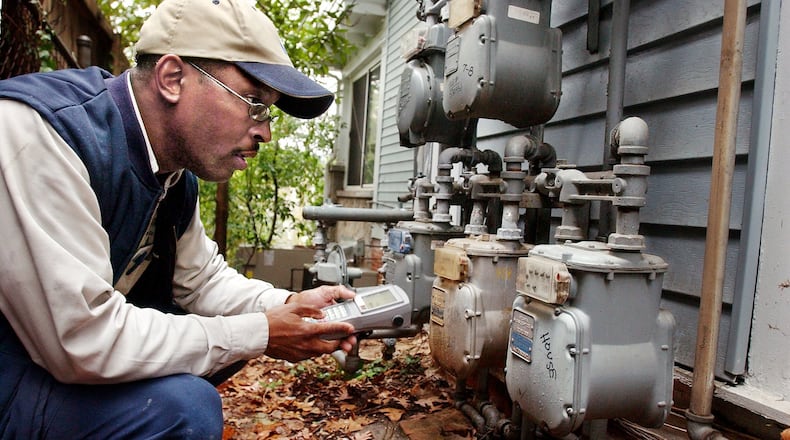Georgia elected officials should cut — not increase — monthly natural gas charges for more than 1.6 million customers in metro Atlanta and elsewhere in the state, regulatory staffers have advised.
In June, Atlanta Gas Light asked state regulators to approve a $96 million rate increase, the largest it had requested in recent memory. That would add nearly $4 a month to average residential customers of natural gas marketers served by the pipeline company.
But in a filing Friday, Public Service Commission staff recommended that AGL’s rates instead should go down from their current level, decreasing about $42 million.
The PSC staff didn’t provide comment on how much that would save the average natural gas customer each month.
AGL isn’t the direct natural gas provider for Georgians. But its charges are automatically listed as a portion of the monthly bills of customers served by more than a dozen natural gas marketers in the state. Consumers typically also pay charges for the amount of natural gas used and sales tax.
Elected members of the PSC are expected to hold new hearings on AGL’s rate request next month and decide the case in December. Rates changes could go into effect with the new year.
AGL spokeswoman Jennifer Golz wrote in an email to The Atlanta Journal-Constitution, that “it is not unusual for the PSC staff to stake out an extreme position in the early stages of a case.”
The company “has made great advancements in safety, reliability and rural gasification over the last 10 years and we look forward to working with the Commission to continue those programs for the benefit of our customers and the communities we serve.”
AGL officials have previously said their rates will remain competitive with peers in the region.
But the PSC’s public interest advocacy staff, which is supposed to provide independent analysis, differed with the company on more than two dozen financial points.
Staffers wrote that the company hadn’t provided sufficient justification showing the benefits of many of the expansions and changes it sought. They recommended a lower rate of return than what AGL requested. And they pushed back against the company for failing to save on costs when its parent company was acquired in 2016 by Atlanta-based Southern Company, the owner of electricity giant Georgia Power and other energy businesses.
Staffers also objected to ratepayers covering some other charges, including AGL executive and employee pay-for-performance incentives tied to company profits. Such expenses “should be borne by shareholders, not customers,” staff wrote in the filing.
The compensation ultimately rewards greater and more frequent rate increases in order to improve Southern’s profits. “There is an inherent conflict between achieving greater financial performance for shareholders and achieving lower rates for customers.”
Georgia energy bills may face other increases in the near future. Georgia Power is also seeking a rate increase that the PSC is expected to act on in December, with some charges potentially rising in January.
What’s next:
The Georgia Public Service Commission is slated to hold more hearings next month on Atlanta Gas Light’s proposal to increase charges. AGL rates are included in monthly bills of more than 1.6 million customers of natural gas marketers in Georgia. The PSC, made up of elected members, is slated to vote on the issue in December. Possible rate changes could go into effect in January.
About the Author
The Latest
Featured



